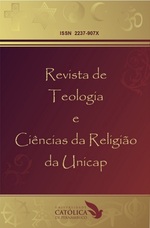ALMA PARA OS DESALMADOS
ENSAIO DE TEOLOGIA ANTROPOLÓGICA A PARTIR DE UMA OBRA DA EXPOSIÇÃO ASSENTAMENTO DE ROSANA PAULINO E DA IDEIA DE COUNTERMEMORY NO TRABALHO DE DESMANTELAMENTO DO MAL NA THEOETHICS DE EMILIE TOWNES
DOI:
https://doi.org/10.25247/paralellus.2024.v15n37.p803-825Palavras-chave:
Theological Anthropology, CountermemoryResumo
Este trabalho trata das dificuldades cotidianas das pessoas negras e das estratégias que colaboram para a recuperação de sua dignidade. Para desmantelar os males que ainda objetificam e reduzem as existências e os corpos dos negros à sua condição racial, como se não tivessem valores e importância, convidamos ao diálogo Rosana Paulino com seu método de refazimento e Emilie Townes com sua noção de contramemória. Paulino e Townes, ao mesmo tempo que trabalham para derrotar as narrativas universais que desprezam a existência negra, sugerem lugares subversivos que reformulam essas “verdades universais”. O método de refazimento combinado com o trabalho de desmantelamento do mal por meio da contramemória não apenas apresenta novas narrativas sobre quem são as pessoas/corpos negros, mas também as redescobre como uma provocação à teologia e sua nova maneira de considerar a antropologia.
Downloads
Referências
ARAÚJO, Flavia Santos. “Rosana Paulino and the Art of Refazimento: Reconfigurations of the Black Female Body in the Land of Racial Democracy”. Brasiliana: Journal for Brazilian Studies. Vol. 8 Nos. 1-2 (2019): 63-90.
A.S. HERLONG PACKING COMPANY. Mammy Brand Orange Label. 1930 (circa). State Archives of Florida, Florida Memory. Disponível em: https://www.floridamemory.com/items/show/342555. Acesso em: 19 de agosto de 2024.
BALDWIN, James, “Too Many Thousands Gone”. Notes of a Native Son. Boston: Beacon Press, 1955.
BROWN, Elisha. “Mammy Jars Mock Black People. Why Are They Still Collected?” The New York Times, (March 2019). Disponível em: https://www.nytimes.com/2019/03/27/arts/mammy-jars-black-history-month.html. Acesso em: 19 de agosto de 2024.
COLEMAN, Monica A. Making a Way out of No Way: A womanist theology. Minneapolis: Fortress Press, 2008.
COPELAND, M. Shawn. Enfleshing Freedom: Body, Race, and Being, 2nd ed. Minneapolis: Fortress Press, 2023.
COPELAND, M. Shawn. Foreword. Enfleshing Freedom: Body, Race, and Being. 1st ed. Minneapolis: Fortress Press, 2010.
COPELAND, M. Shawn. “#BlackLivesMatter as Public Theology”. BCTS Annual Public Lecture. The University of Notre Dame Youtube Channel. 2017. Disponível em: https://www.youtube.com/live/pylZZpLVRr8?si=BJNeYelefqSSlz_j. Acesso em: 19 de agosto de 2024.
ERMAKOFF, George. O negro na fotografia brasileira do século XIX. Rio de Janeiro: Casa Editorial, 2004.
GOLDENBERG, David M. Black and Slave: The Origins and History of the Curse of Ham. v. 10, Berlin; Boston: De Gruyter, 2017.
HARTMAN, Saidiya. “Venus in Two Acts.” Small Axe, vol. 12, no. 2 (July 2008): 1–14. Disponível em: https://muse.jhu.edu/article/241115. Acesso em: 19 de agosto de 2024.
HARTSOCK, Chad. “An Introduction to Physiognomy.” Sight and Blindness in Luke-Acts: the use of physical features in characterization. Leiden; Boston: Brill, 2008.
HOOKS, bell. yearning: race, gender, and cultural politics. New York, London: Routledge Taylor & Francis Group, 2015.
JUNIOR, Nyasha. Reimagining Hagar: Blackness and Bible. New York: Oxford University Press, 2019.
PAULINO, Rosana. “Assentamento.” Educativo. Nov.-Dec. 2013.
PAULINO, Rosana. “Parede da Memória - Rosana Paulino.” Celia Antonacci YouTube Channel. Oct. 2020. Disponível em: https://youtu.be/vkFdzF4y6c0?si=bMbqZqKaWXQsOOmC. Acesso em: 19 de agosto de 2024.
PAULINO, Rosana. Rosana Paulino: a costura da memória. Catálogo. São Paulo: Pinacoteca de São Paulo. (Dec. 2018) Disponível em: https://pinacoteca.org.br/programacao/exposicoes/rosana-paulino-a-costura-da-memoria/. Acesso em: 19 de agosto de 2024.
PAULINO, Rosana. “A Costura da Memória - Rosana Paulino.” Celia Antonacci YouTube Channel. Feb. 2019. Disponível em: https://youtu.be/uNEIJArBdKw?si=-jMFOpjccgJ_Ga9Q. Acesso em: 19 de agosto de 2024.
QUIJANO, Aníbal. “Coloniality of Power, Eurocentrism and Latin America.” The coloniality of knowledge: Eurocentrism and social sciences. Latin American perspectives. Buenos Aires: CLACSO, Consejo Latinoamericano de Ciencias Sociales, 2005, 117-142. Disponível em: https://biblioteca.clacso.edu.ar/clacso/sur-sur/20100624103322/12_Quijano.pdf. Acesso em: 19 de agosto de 2024.
ROYAL ANTHROPOLOGICAL INSTITUTE. GRID – anthropometric photographs and potential history. Sep.-Oct. 2023. Disponível em: https://www.therai.org.uk/the-rai-photographic-library/grid-anthropometric-photographs-and-potential-history#:~:text=The%20practice%20of%20anthropometry%20used,to%20superficially%20measure%20physical%20characteristics. Acesso em: 19 de agosto de 2024.
SEGURA, Olga. “Theologians affirm 'Black Theology Matters' at the symposium.” Catholic National Reporter October, 2021. Disponível em: https://www.ncronline.org/news/opinion/theologians-affirm-black-theology-matters-symposium. Acesso em: 19 de agosto de 2024.
TOWNES, Emilie M. Womanist Ethics and the Cultural Production of Evil. New York: Palgrave Macmillan, 2006.
TVARDOVSKAS, Luana Saturnino. “Vertigoes and shades of Brazilianness: Heterotopias, colonialism and the feminist critique of art.” Labrys, Études Féministes/Estudos Feministas. Jan-Jun. 2015. Disponível em: https://www.labrys.net.br/labrys27/heterotopies/luana.htm#_edn1. Acesso em: 19 de agosto de 2024.
Downloads
Publicado
Edição
Seção
Licença
Copyright (c) 2024 Faustino dos Santos, Gilbraz de Souza Aragão

Este trabalho está licenciado sob uma licença Creative Commons Attribution 4.0 International License.
A submissão de originais para a Paralellus implica a transferência, pelos autores, dos direitos de publicação eletrônica. Os direitos autorais para os artigos veiculados neste periódico são do autor; todavia, são da revista os direitos sobre a primeira publicação. Os autores somente poderão fazer uso dos mesmos resultados em outras publicações se indicarem, claramente, que a Paralellus foi o meio originalmente utilizado. Em decorrência do fato de ser a Paralellus uma revista de acesso público, é permitida a utilização gratuita dos artigos em aplicações educacionais e/ou científicas não comerciais, desde que respeitando-se a exigência de citação da fonte (Texto atualizado em 16-11-2020).



















